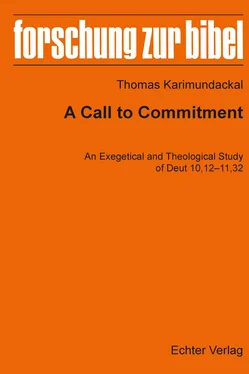7 Interpretation, 91-92.107-108.
CHAPTER 1
APPROACHING THE TEXT
This chapter is devoted to a threefold examination of Deut 10,12-11,32. It deals consecutively with the delimitation of the text, its context, and its translation with text-critical observations and evaluations. The purpose of this chapter is to define the text as precisely as possible with a view to its literary analysis and interpretation. 1
1. The delimitation of the examined text
This section deals with the delimitation of the text under investigation to distinguish clearly the boundary marks of the literary unit. Changes with regard to linguistic features, characters, time, places, and themes in relation to the preceding and the following major textual units are considered as the main criteria for the delimitation. Attention is also paid to Setuma and Petucha as signs of division in the MT as additional criteria.
1.1 Deut 10,12 - the beginning of the fifth parenesis
Deut 10,12 is considered as the beginning of the fifth parenesis for the following reasons:
a) Shift in the communication: Deut 10,11 is a directly quoted speech where Moses recalls what the Lord has told him about the possession of the Promised Land, and the Lord’s command to Moses here is itself given in direct speech, i.e., we see a direct discourse within a direct discourse: The Lord said to me (ויאמר יהוה אלי), “Get up… to give them” (קום לך … לתת להם). However, in 10,12 Moses turns directly to Israel (ועתה ישׂראל) showing an urgency with regard to what follows.
b) Change of characters: From the perspective of communication, we see a shift in speaker and addressee from v11 (God → Moses) to v12 (Moses → Israel).
c) Change of place: There is a spatial shift in the narrative from 10,1-11 to 10,12-11,32. 10,1-11 narrates the restoration of the Horeb covenant and the section concludes with the narration of Moses’ stay on the mountain (v10-11). The order of Israel’s stops in the wilderness (בארת יטבתה ,גדגדה ,מוסרה ,בני־יעקן cf.10,6-7; сf. Num 33,31-33) and establishing the Levites as curators of both the ark and the stone tablets (10,8-9; cf. Num 20:22-29) also refer to Israel’s experiences in the desert. However, in 10,12-11,32 Moses tells Israel at Moab of God’s grace and forgiveness and calls them urgently to make a fresh start.
d) Change of theme: While 10,11 returns to the theme of 9,1 and rounds off the section (9,1-10,11), 2in 10,12 Moses begins a hortatory moral teaching calling on the people to make a fresh start.
e) Change of time: Temporally, there is a narrative shift from 10,1-11 to 10,12-11,32. עתה in 10,12 marks a clear distinction from בעת ההוא in 10,1.8. 3The invitation to make a commitment at the present moment is also expressed by the term היום in 10,13 (cf. 10,15; 11,2.4.8.13.26. 27. 28.32). 4Moses’ “forty days and forty nights” stay on the Mountain (10,10) is immediately contrasted with ועתה and היום in 10,13.
f) Linguistic changes:
1) The deictic clause modifier ועתה brings a logical conclusion to the historical survey of 9,7-10,11 5and marks a shift to parenetic instructions. 6
2) The vocative nature of the phrase ועתה ישׂראל (cf. 4,1) also indicates a clear structural break, marking a transition from historical narrative to a hortatory appeal. 7
3) 10,12 also begins with a rhetorical question מה יהוה אלהיך שׁאל מעמך (12b) to draw the attention of the people and to emphasize the didactic nature of the answer. 8
4) The wayyiqtol constructions ) 9(ויאמר ,וישׁמע in 10,10-11 are replaced by a series of infinitives in the construct state prefixed with the preposition ל in 10,12-13 (,לעבד ,לאהבה ,ללכת ,ליראה לשׁמר) and therefore there is a change in the style of language.
g) The Petucha (פ) found after 10,11 in the MT of Codex Leningradensis also suggests a new beginning and supports the preceding arguments.
Considering the arguments mentioned above based on contextual and text-linguistic grounds, I conclude that 10,10-11 close the fourth parenesis (9,1-10,11) and 10,12 marks the beginning of the fifth parenesis (10,12-11,32). 10
1.2 Deut 11,32 - the end of the fifth parenesis
Although the communication and the characters do not change from 10,12-11,32 to the following unit 12,1-13,1, the following elements mark 11,32 as the end of the parenesis in 10,12-11,32.
a) Change of place: The first detailed command in 12,1-7 concerns the way Israel is to worship in the Promised Land and v5-7 tell Israel clearly to worship at the place where Yhwh puts his name, although it remains unnamed. 11While המקום in 11,5 refers to Moab and in 11,24 to every place that Israel will conquer in the Promised Land, המקום in 12,2.5 refers to sanctuaries, both the sanctuaries of the Canaanites and the place Yhwh will choose for his people. 12Thus, the emphasis on Yhwh choosing a place for his name in ch. 12 (12,5.11.14.18.21.26; cf. 14,23-25; 16,2.6-7; 17,8.10) marks a transition from Moab, the place of decision, to the place Yhwh will choose to put his name. In addition to this, the reference to Mounts Gerizim and Ebal in 11,29 and their geographical description in 11,30 is immediately contrasted with the command to demolish all the places where the nations worship their gods (12,2).
b) Change of time: In contrast to the ועתה and היום of 10,12-11,32, we see a pervasive sense of future in ch. 12. 13The asyndetic clause אלה החקים והמשׁפטים in 12,1 introduces what Israel should follow “in the land” (בארץ) and “all the days that you live upon the earth” (כל־הימים 14. ( אשׁר־אתם חיים על־האדמה The imperfect verb pattern in the chapter, whether it is qal or piel or hiphil, expresses a future situation in the Promised Land, a situation in the process of accomplishment. 15
c) Change of theme: The hortatory moral teaching in 10,12-11,32 is changed to specific stipulations introduced by החקים והמשׁפטים in 12,1. 16
d) Linguistic changes:
1) The clause אנכי נתן לפניכם היום in 11,26b and 11,32c marks an inclusion and brings a conclusion to the final section of the parenesis . 17
2) V31-32 form a short summary of the hortatory appeal in 10,12-11,30. 18The future life in the Promised Land, which begins with the crossing of the Jordan (v31), should be characterized by keeping the commandments of the Lord (v32). Thus, the exhortation to keep and carry out the commandments and the statutes of the Lord in v32 reasserts the central concern of Moses’ exhortation in 10,12-11,32, i.e. to keep the commandments of the Lord (cf. 11,1.8.13.22; cf. 4,5-6; 6,1; 8,6.11). In addition to this, the temporal clause in v31a (כי + participial sentence), functions as the protasis of v31-32, bringing an end to the whole train of thought in 10,12-11,32. 19The traditional causal rendering of כי in 11,31 20apparently suggests that v31-32 are part of the introduction to the specific stipulations in Deut 12-26. However, this cannot be substantiated in the context because Israel’s crossing the Jordan to enter and possess the land does not provide a reason for the command to “give the blessing on Mount Gerizim and the curse on Mount Ebal” (11,29). However, a temporal consideration of כי will adequately explain what follows: “when you cross the Jordan to enter to possess the land which the Lord …”
3) Just as Moses ends his discourse on specific stipulations with a stress on covenant blessings and curses (26,16-19), the parenetical discourse also comes to an end with a similar thrust (11,26-28).
Читать дальше












